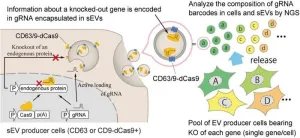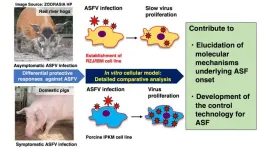(Press-News.org) Bethesda, MD (Nov. 15, 2024) — The American Gastroenterological Association (AGA) has released a new clinical guideline on the pharmacological management of moderate-to-severe ulcerative colitis, published today in Gastroenterology. This guideline groups the 12 currently available advanced treatments based on efficacy, to simplify the decision-making process for gastroenterologists and the approximately 1.25 million patients in the U.S. living with ulcerative colitis.
“Since the first biologic treatment for ulcerative colitis was introduced in 2005, 11 advanced therapies have become available in the U.S.,” said guideline author Ashwin N. Ananthakrishnan. “AGA’s updated guidelines integrate both tried-and-true treatments and the latest advancements, offering patients and providers the most current recommendations for managing moderate-to-severe ulcerative colitis.”
To streamline treatment selection, AGA categorized drugs with similar efficacy into "efficacy buckets" that allow clinicians to consider a range of effective treatments based on the likelihood of inducing remission, regardless of the drug’s mechanism. Comparative efficacy recommendations in the guideline are based on a systematic review and network meta-analysis (Comparative Efficacy of Advanced Therapies for Management of Moderate-to-Severe Ulcerative Colitis: 2024 American Gastroenterological Association Evidence Synthesis - Gastroenterology) of published evidence. Using this rigorous process resulted in practical, trustworthy guidance to help patients and clinicians evaluate multiple factors to tailor care, rather than selecting a single “best” treatment.
Key factors influencing treatment decisions include a patient’s risk of disease complications, disease severity, and other considerations such as comorbidities, age, safety risks, and pregnancy status. Additionally, prior treatment history can impact the effectiveness of subsequent therapies, underscoring the importance of personalized treatment planning.
Treatment recommendations:
AGA recommends patients with moderate-to-severe ulcerative colitis start with advanced therapies and/or immunomodulators over a step-up approach following 5-aminosalicylates (5-ASA) failure.
For patients who have not previously received advanced therapies, the medications with the highest efficacy include infliximab, vedolizumab, ozanimod, etrasimod, upadacitinib, risankizumab and guselkumab.
Among patients with prior exposure to advanced therapies, particularly those who have experienced TNF antagonist failure, the medications with the highest efficacy are tofacitinib, upadacitinib, and ustekinumab.
As a living guideline, semiannual reviews of this body of evidence will be conducted by the authors, and recommendations will be updated when indicated.
Understanding ulcerative colitis
There are two main types of inflammatory bowel disease (IBD) — ulcerative colitis and Crohn’s disease. Ulcerative colitis causes inflammation (swelling) and sores (called ulcers) in the large intestine (colon and rectum) and may affect part or all of the large intestine. Ulcerative colitis can happen at any age, but it is more likely to develop in people between the ages of 15 and 40. While there is no cure for ulcerative colitis, there are many options to help treat it, and the medications described in this AGA guideline can lead to remission (periods of no symptoms). Learn more about ulcerative colitis in the AGA GI Patient Center.
###
AGA Media Contact: Annie Mehl, Communications and Media Relations Manager, media@gastro.org, 301-327-0013
About the AGA Institute
The American Gastroenterological Association is the trusted voice of the GI community. Founded in 1897, the AGA has grown to more than 16,000 members from around the globe who are involved in all aspects of the science, practice and advancement of gastroenterology. The AGA Institute administers the practice, research and educational programs of the organization. www.gastro.org
AGA is on Instagram.
Like AGA on Facebook.
Follow us on X @AmerGastroAssn
Check out our videos on YouTube.
Join AGA on LinkedIn.
About Gastroenterology
Gastroenterology is the most prominent journal in the field of gastrointestinal disease. As the official journal of the AGA Institute, Gastroenterology delivers up-to-date and authoritative coverage of both basic and clinical gastroenterology. Regular features include articles by leading authorities and reports on the latest treatments for diseases. Original research is organized by clinical and basic-translational content, as well as by alimentary tract, liver, pancreas, and biliary content. www.gastrojournal.org/
END
First American Gastroenterological Association living guideline for moderate-to-severe ulcerative colitis
Subhead: Patients should start advanced therapies early rather than gradual step-up treatment
2024-11-19
ELSE PRESS RELEASES FROM THIS DATE:
Labeling cell particles with barcodes
2024-11-19
Cell-to-cell communication through nanosized particles, working as messengers and carriers, can now be analyzed in a whole new way, thanks to a new method involving CRISPR gene-editing technology. The particles, known as small extracellular vesicles (sEVs), play an important role in the spread of disease and as potential drug carriers. The newly developed system, named CIBER, enables thousands of genes to be studied at once, by labeling sEVs with a kind of RNA “barcode.” With this, researchers hope to find what factors are involved in sEV release from ...
Groundwater pumping drives rapid sinking in California
2024-11-19
A new study shows land in California’s San Joaquin Valley has been sinking at record-breaking rates over the last two decades as groundwater extraction has outpaced natural recharge.
The researchers found that the average rate of sinking for the entire valley reached nearly an inch per year between 2006 and 2022.
Researchers and water managers have known that sinking, technically termed “subsidence,” was occurring over the past 20 years. But the true impact was not fully appreciated because the total subsidence had not been quantified. This was in part due to a gap in data. Satellite radar systems, which provide the most precise measure of elevation changes, ...
Neuroscientists discover how the brain slows anxious breathing
2024-11-19
LA JOLLA (November 19, 2024)—Deep breath in, slow breath out… Isn’t it odd that we can self-soothe by slowing down our breathing? Humans have long used slow breathing to regulate their emotions, and practices like yoga and mindfulness have even popularized formal techniques like box breathing. Still, there has been little scientific understanding of how the brain consciously controls our breathing and whether this actually has a direct effect on our anxiety and emotional state.
Neuroscientists ...
New ion speed record holds potential for faster battery charging, biosensing
2024-11-19
PULLMAN, Wash. – A speed record has been broken using nanoscience, which could lead to a host of new advances, including improved battery charging, biosensing, soft robotics and neuromorphic computing.
Scientists at Washington State University and Lawrence Berkeley National Laboratory have discovered a way to make ions move more than ten times faster in mixed organic ion-electronic conductors. These conductors combine the advantages of the ion signaling used by many biological systems, including the human body, with the electron signaling used by computers.
The new development, detailed in the journal ...
Haut.AI explores the potential of AI-enhanced fluorescence photography for non-invasive skin diagnostics
2024-11-19
Tallinn, Estonia – 19th November 2024, 10 AM CET – Haut.AI, a pioneering artificial intelligence (AI) company for skincare and beauty applications, has published an exciting scientific review—one that explores state-of-the-art developments in skin fluorescence photography and its applications, focusing on combining it with AI algorithms for non-invasive skin diagnostics. The study highlights the power of AI to enhance skin fluorescence photography, allowing early, non-invasive detection of skin conditions. This approach allows skincare experts to diagnose underlying issues ...
7-year study reveals plastic fragments from all over the globe are rising rapidly in the North Pacific Garbage Patch
2024-11-19
A study published today in IOP Publishing’s journal Environmental Research Letters reveals that centimetre-sized plastic fragments are increasing much faster than larger floating plastics in the North Pacific Garbage Patch [NPGP], threatening the local ecosystem and potentially the global carbon cycle.
The research, which draws from not-for-profit The Ocean Cleanup’s systematic surveys of the NPGP between 2015 and 2022, found an unexpected rise in mass concentration of plastic fragments that are ...
New theory reveals the shape of a single photon
2024-11-19
A new theory, that explains how light and matter interact at the quantum level has enabled researchers to define for the first time the precise shape of a single photon.
Research at the University of Birmingham, published in Physical Review Letters, explores the nature of photons (individual particles of light) in unprecedented detail to show how they are emitted by atoms or molecules and shaped by their environment.
The nature of this interaction leads to infinite possibilities for light to exist and propagate, or travel, through its surrounding environment. This limitless ...
We could soon use AI to detect brain tumors
2024-11-19
A new paper in Biology Methods and Protocols, published by Oxford University Press, shows that scientists can train artificial intelligence models to distinguish brain tumors from healthy tissue. AI models can already find brain tumors in MRI images almost as well as a human radiologist.
Researchers have made sustained progress in artificial intelligence (AI) for use in medicine. AI is particularly promising in radiology, where waiting for technicians to process medical images can delay patient treatment. Convolutional neural networks are powerful tools that allow researchers to train AI models on large image datasets to recognize ...
TAMEST recognizes Lyda Hill and Lyda Hill Philanthropies with Kay Bailey Hutchison Distinguished Service Award
2024-11-19
TAMEST is pleased to announce Lyda Hill and Lyda Hill Philanthropies as the recipients of the Kay Bailey Hutchison Distinguished Service Award.
TAMEST is recognizing Lyda Hill and her team for empowering and enabling groundbreaking research in science and nature that profoundly impacts society. Lyda Hill, a successful businesswoman and world-renowned philanthropist, believes science can solve many of the world’s most challenging issues and has chosen to donate all of her estate to philanthropy and scientific research.
Aligned with this mission, Lyda Hill is committed to advancing science and public ...
Establishment of an immortalized red river hog blood-derived macrophage cell line
2024-11-19
Red river hogs (RRHs) (Potamochoerus porcus), a wild species of Suidae living in Africa, have grabbed much attention as an animal that harbors African swine fever virus (ASFV) as natural hosts. When ASFV infects domestic pigs and wild boars, it proliferates within macrophages, a type of immune cells, and infected pigs rapidly die suffering from symptoms such as fever and hemorrhage. On the other hand, ASFV infection in RRHs is asymptomatic and does not cause death, suggesting that RRH macrophages may have a protective mechanism against ASFV infection.
In vitro cell cultures of porcine macrophages are generally ...
LAST 30 PRESS RELEASES:
Study reveals insights about brain regions linked to OCD, informing potential treatments
Does ocean saltiness influence El Niño?
2026 Young Investigators: ONR celebrates new talent tackling warfighter challenges
Genetics help explain who gets the ‘telltale tingle’ from music, art and literature
Many Americans misunderstand medical aid in dying laws
Researchers publish landmark infectious disease study in ‘Science’
New NSF award supports innovative role-playing game approach to strengthening research security in academia
Kumar named to ACMA Emerging Leaders Program for 2026
AI language models could transform aquatic environmental risk assessment
New isotope tools reveal hidden pathways reshaping the global nitrogen cycle
Study reveals how antibiotic structure controls removal from water using biochar
Why chronic pain lasts longer in women: Immune cells offer clues
Toxic exposure creates epigenetic disease risk over 20 generations
More time spent on social media linked to steroid use intentions among boys and men
New study suggests a “kick it while it’s down” approach to cancer treatment could improve cure rates
Milken Institute, Ann Theodore Foundation launch new grant to support clinical trial for potential sarcoidosis treatment
New strategies boost effectiveness of CAR-NK therapy against cancer
Study: Adolescent cannabis use linked to doubling risk of psychotic and bipolar disorders
Invisible harms: drug-related deaths spike after hurricanes and tropical storms
Adolescent cannabis use and risk of psychotic, bipolar, depressive, and anxiety disorders
Anxiety, depression, and care barriers in adults with intellectual and developmental disabilities
Study: Anxiety, gloom often accompany intellectual deficits
Massage Therapy Foundation awards $300,000 research grant to the University of Denver
Gastrointestinal toxicity linked to targeted cancer therapies in the United States
Countdown to the Bial Award in Biomedicine 2025
Blood marker from dementia research could help track aging across the animal world
Birds change altitude to survive epic journeys across deserts and seas
Here's why you need a backup for the map on your phone
ACS Central Science | Researchers from Insilico Medicine and Lilly publish foundational vision for fully autonomous “Prompt-to-Drug” pharmaceutical R&D
Increasing the number of coronary interventions in patients with acute myocardial infarction does not appear to reduce death rates
[Press-News.org] First American Gastroenterological Association living guideline for moderate-to-severe ulcerative colitisSubhead: Patients should start advanced therapies early rather than gradual step-up treatment







